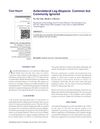 July 2023 in “Journal of Cosmetic Dermatology”
July 2023 in “Journal of Cosmetic Dermatology” The September 2023 issue highlights the importance of safety in cosmetic procedures and updates on treatments for acne, rosacea, and hair restoration.
 February 2024 in “Australasian journal of dermatology”
February 2024 in “Australasian journal of dermatology” Inflammatory acne damages skin stem cells and reduces their growth, leading to atrophic acne scars.
27 citations,
July 2013 in “The journal of investigative dermatology/Journal of investigative dermatology” Lasers have become precise tools in skin treatment and diagnosis, with ongoing advancements improving their effectiveness.
[object Object] 19 citations,
March 2021 in “Experimental and Therapeutic Medicine” Isotretinoin can cause serious birth defects and needs careful use, especially in pregnant women.

Taking too much Albendazole can cause hair loss and other serious side effects.
 2 citations,
May 2022 in “Cutis”
2 citations,
May 2022 in “Cutis” Taking too much Albendazole can cause hair loss and other serious side effects.
1 citations,
June 2003 in “CRC Press eBooks” Stress can worsen some skin diseases like psoriasis and eczema.
 11 citations,
January 1998 in “Dermatology”
11 citations,
January 1998 in “Dermatology” Isotretinoin effectively treated severe acne in HIV-positive women, with improved skin and CD4 counts, but some experienced side effects like skin dryness and hair loss.
 4 citations,
February 2011 in “Dermatology reports”
4 citations,
February 2011 in “Dermatology reports” Acitretin can cause excess tissue growth and hair loss.
 165 citations,
January 2014 in “Dermatology Research and Practice”
165 citations,
January 2014 in “Dermatology Research and Practice” Zinc is effective for treating various skin conditions, including warts and acne.
 1 citations,
January 2019 in “Springer eBooks”
1 citations,
January 2019 in “Springer eBooks” Hidradenitis Suppurativa is a chronic skin condition best treated early with surgery for better outcomes and less recurrence.
 4 citations,
August 2015 in “Medical Hypotheses”
4 citations,
August 2015 in “Medical Hypotheses” The conclusion suggests that the hormone ghrelin might link acid reflux to oily skin.
 11 citations,
January 2014 in “International Journal of Trichology”
11 citations,
January 2014 in “International Journal of Trichology” Witch hazel-based hair products improved scalp irritation and were well-tolerated.
5 citations,
April 2016 in “PubMed” Cetuximab often causes skin problems, but they can be managed without stopping treatment.
1 citations,
November 2021 in “Journal of General and Family Medicine” Stopping finasteride improved a man's skin rash caused by light exposure.
 6 citations,
February 2015 in “Anais Brasileiros de Dermatologia”
6 citations,
February 2015 in “Anais Brasileiros de Dermatologia” Patients with mycosis fungoides have a higher risk of heart disease.

COVID-19 can cause skin problems and affect dermatology treatments, with recommendations for skin care and cautious use of certain drugs.
 5 citations,
January 2014 in “International Journal of Trichology”
5 citations,
January 2014 in “International Journal of Trichology” Hair loss on the lower legs is common in middle-aged men, usually harmless, and doesn't need treatment.
 October 2020 in “Our Dermatology Online”
October 2020 in “Our Dermatology Online” Chronic bacterial infections of hair follicles can cause ongoing skin inflammation.
 October 2022 in “Aesthetic Cosmetology and Medicine”
October 2022 in “Aesthetic Cosmetology and Medicine” PCOS often causes skin problems due to hormonal and metabolic imbalances.
 7 citations,
May 2022 in “International Journal of Environmental Research and Public Health”
7 citations,
May 2022 in “International Journal of Environmental Research and Public Health” Isotretinoin therapy for acne can cause many reversible side effects, mainly mild skin conditions, and patient understanding of these effects can improve treatment adherence.
28 citations,
September 2021 in “EMBO reports” Osthole inhibits the TRPV3 channel by binding to specific sites, potentially aiding drug development for skin diseases and cancers.
 April 2014 in “Medical Clinics of North America”
April 2014 in “Medical Clinics of North America” Accurate diagnosis and tailored treatment are crucial for managing common primary care symptoms.
 11 citations,
May 1976 in “Archives of Dermatology”
11 citations,
May 1976 in “Archives of Dermatology” Starving yourself can cause hair loss, but stopping the diet can improve it.
 July 2022 in “International journal of dermatology, venereology and leprosy sciences”
July 2022 in “International journal of dermatology, venereology and leprosy sciences” More frequent and severe skin problems are linked to higher daily alcohol consumption.
 3 citations,
January 2008 in “Journal of the American Academy of Dermatology”
3 citations,
January 2008 in “Journal of the American Academy of Dermatology” A patient's skin rash did not affect the area where a previous viral rash was healing, suggesting a rare immune response.
 18 citations,
March 2011 in “Archives of ophthalmology”
18 citations,
March 2011 in “Archives of ophthalmology” Ringworm around the eyes often gets misdiagnosed, leading to eyelash loss, but antifungal treatment can improve the condition.
[object Object]  243 citations,
September 2016 in “Dermatology and Therapy”
243 citations,
September 2016 in “Dermatology and Therapy” Dermoscopy is a useful tool for identifying features of skin conditions, but more research is needed to define its role in dermatology.
1 citations,
January 2021 in “Journal of dermatology & dermatologic surgery” Oral isotretinoin does not cause milia in acne patients.
 15 citations,
September 2015 in “Journal der Deutschen Dermatologischen Gesellschaft”
15 citations,
September 2015 in “Journal der Deutschen Dermatologischen Gesellschaft” Skin doctors should recognize and treat conditions like hair-pulling and skin-picking early, often using therapy and medication, to help 50-70% of patients.























